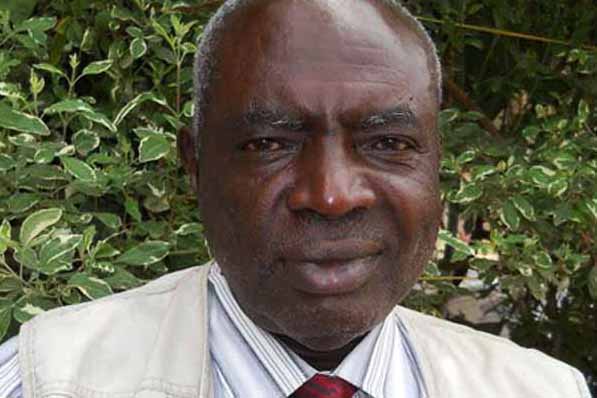Prime
Blind mother struggles to raise visually impaired children

Thirty-year-old Aisha Namulema has had to bear the burden of raising of her children after the two men who fathered them left.
What you need to know:
BLIND FAMILY. Thirty-year-old Aisha Namulema has had to bear the burden of raising of her children after the two men who fathered them left
Uncomfortable sensation of helplessness and sheer anxiety are what befall the outer and inner person upon paying a visit to Aisha Namulema’s home at Kijjumbula Village in Rakai District.
At 30 years of age, Namulema is a single mother of four; a pair of twins (boy and girl) aged nine, her third and last born boy and girl aged five and three years old, respectively.
This pitiable family of five stays in a wobbly single-roomed house, molded with mud and eucalyptus poles for support.
Namulema says she lost her sight at eight years, when she was studying in Primary One at Kyenvubu Primary School located in Rakai District. She recalls a blurred coating suddenly covering her eyes to destroy her whole sight.
She explains that because she was from an impoverished family, she failed to get specialised medical attention for her ailment.
This incidentally marked the end of her days in school and the beginning of the untold suffering she is currently undergoing.
“My parents tried all they could using herbs and basic medicines, but nothing helped. I instead became shortsighted, and would completely lose my sight when exposed to sunshine,” she narrates.
Namulema started her life as a visually impaired child, raised in a polygamous family of nine siblings. At 20 years of age, she met Jordan Ssempijja, a village-mate, with whom she began the journey of parenting.
She moved in with her mother-in-law when she got pregnant and bore a pair of twins first and three years later, a baby boy.
Her twin daughter and their third born also presented with blurred eye vision when they were just 11 months old and one year old respectively. “My husband superstitiously mistook the poor sight of our children for witchcraft, although he never found any medicines to provide healing,” she says.
When her mother-in-law passed on, it marked the end of the little comfort she had found at her husband’s home. Ssempijja abandoned the family under the guise of finding a well-paying job in Kampala. “It is almost five years since he left and he has never returned or sent any support to the family he left behind,” she says.
Left with no survival alternative, Namulema returned to her grandmother who gave her the small portion of land on which they live before she died. She supported her family by working as a casual labourer. When she met another man with whom she had her fourth child, he also abandoned her.
“I had actually expected him to support us but he did not. I have lost all hope,” she says.
Eventually, Namulema completely lost her eyesight and her other three children remain half-blind. They are helpless, surviving at the mercy of well-wishers and passersby. The children and their mother are visibly frail, wear very old clothes, and their feat infected with jiggers and have unshaped fingernails.
Inside their falling house, Namulema owns a tinny wooden bed and an old-dusty mattress on which she squeezes herself and her two daughters. “The boys sleep on a bare floor because we cannot fit on this small bed,” she explains. When we meet, I make out from the children’s conversation that they had, for two consecutive days, slept on empty stomachs.
These minors are now the primary breadwinners of the family. They fetch water for their neighbours at shs500 per jerry cane, which money they later use to buy maize flour to prepare porridge which is their daily meal. Other essentials such as soap, sugar, tea leaves, toothpaste and the like are luxuries to this starving family.
Namulema acknowledges the hardships her young children undergo to fetch water but says she has no other way to survive. “They have learnt to persevere and can now work with less difficulty,” she adds.
No authority intervention
The local council authorities including the community development officer have not been concerned at all, or even pursued one of her children’s father who is walking freely around the village.
Namulema tells me her youngest daughter contracted a fever the previous night and the member of village health team who often checks on them had not showed up yet.
Her main concern remains the failure to send her children to school and the lack of food. Adjacent to the house is an inter-cropped plantation of maize, beans and cassava, whose germination rate is however so poor, leaving the family’s future survival under great uncertainty.
Achilles Kiwanuka, a village health volunteer and para-social worker deployed by The Aids Support Organisation-TASO, says they are also too constrained to help. “We also don’t have resources to support the family even when we would wish to do so. The remaining alternative is to look for well-wishers who can help them” he suggests.
EXPERT OPINION
Janet Nakalisa, a professional eye care specialist at Masaka Optical Services says it is not a common occurrence to find family with all members blinds. She, however, explains that it is possible due to risk factors that may range from genetic or nutrition deficiencies to eye-related diseases that include Trachoma.
“When people present with eye problems, we conduct a comprehensive study of the patient to establish the cause of the problem, besides analysing their eyesight errors to determine the required glasses,’ she notes, advising the family to seek expert services.
According to Chris Mungoma, a counsellor at The Aids Support Organisation (TASO) Masaka, who supervises the area where the family lives, “We are looking out for any charity support in terms of resources that would enable them to afford medical attention for the family.”




